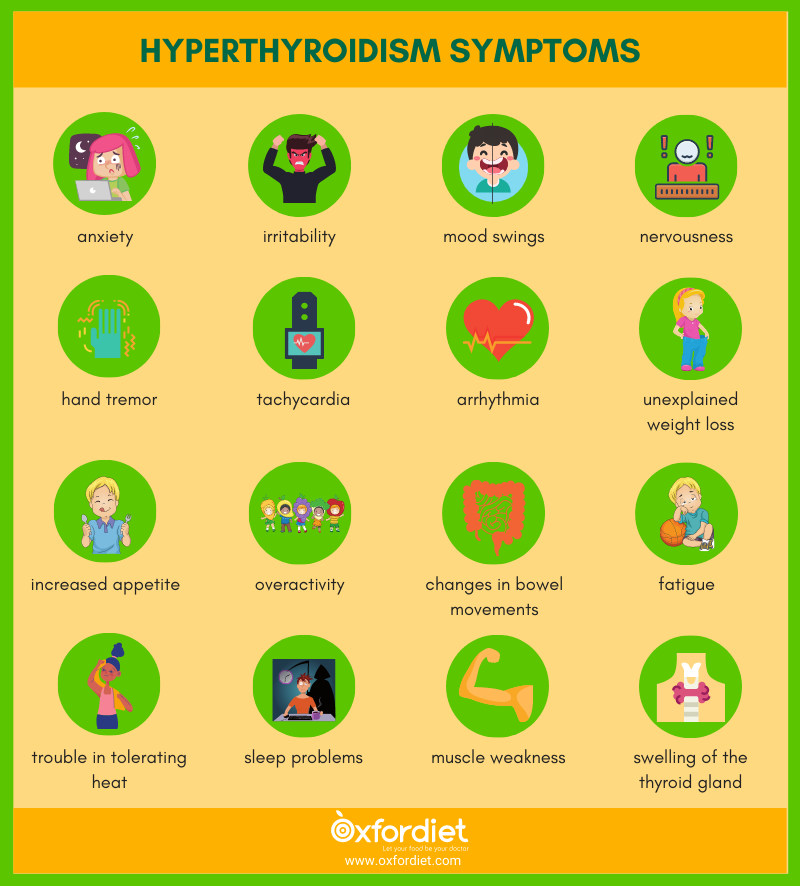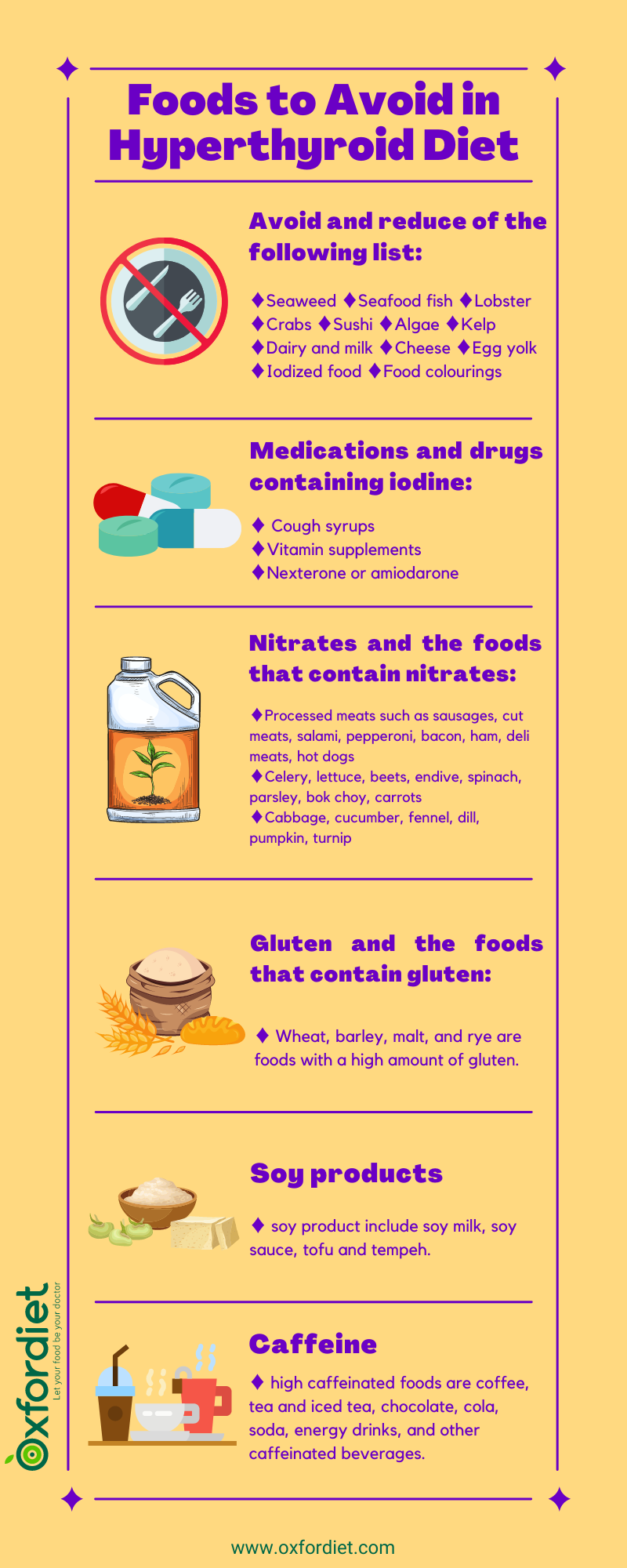Following a proper diet and eating certain foods in a hyperthyroidism diet can help keep the thyroid in good health and reduce hyperthyroidism's adverse effects. Some minerals, vitamins and other nutrients are needed for proper thyroid function.
A low-iodine diet is usually prescribed before hypertensive treatment for hyperthyroidism. For example, a low-iodine diet is used for hyperthyroidism before starting radiotherapy to kill damaged thyroid cells.
Even after treatment, the iodine balance in a hyperthyroid diet is essential.
Hyperthyroidism is the second most common endocrine disorder after diabetes mellitus. It is a small butterfly-shaped gland that in the condition of producing ore hormones is also called overactive thyroid. The most common type of hyperthyroidism is Graves' disease, which occurs due to the thyroid gland's overstimulation. It happens at the age of 50.
To diagnose the disease, in addition to the symptoms of the disease, the level of thyroid hormones in the blood should be measured, and in case of hyperthyroidism, medication and hyperthyroidism diet should be started for the patient. Hyperthyroidism responds well to treatment, and many patients are able to control their hyperthyroidism with medicines and diet.
Thyroid Hormones control the metabolism, breathing, weight control, nervous system, body temperature, and any disorders in the production and amount of the thyroid hormones can disrupt the mentioned functions.
Hyperthyroidism increases metabolism and causes symptoms include:
♦ anxiety
♦ irritability
♦ mood swings
♦ nervousness
♦ hand tremor
♦ tachycardia
♦ arrhythmia
♦ unexplained weight loss
♦ increased appetite
♦ overactivity
♦ changes in bowel movements
♦ fatigue
♦ trouble in tolerating heat
♦ sleep problems
♦ muscle weakness
♦ swelling of the thyroid gland

It is more common between women than men. A family history, problems such as pernicious anemia (deficiency of vitamin B12), type 1 diabetes, hormonal disorders like primary adrenal insufficiency (Addison's disease), age more than 60, and swollen thyroid gland are the kind of diseases that may lead to hyperthyroidism condition.
Consuming meals containing a large amount of iodine, being older than 60 ages, and being pregnant are the other risk factors that can lead to the development of hyperthyroidism.
Grave's disease, overactive thyroid nodules, thyroiditis, increased iodine consumption, and the increased medicine hormone intake can cause hyperthyroidism.
♦ Arrhythmia and the irregular heartbeat
♦ clots
♦ heart failure
♦ stroke
♦ eye's problems and ophthalmology Grave's
♦ osteoporosis
♦ menstruation changes
The anti-thyroid medication prevents the product of excessive thyroid hormones T3 and T4.
A high level of thyroid hormones can be harmful and toxic to the body.
Beta-blockers, Anti-thyroid medications, Ancillary agents are the drugs that are prescribed by the doctor. Radioactive iodine and surgery are the other ways of treatment that the doctor will decide to use the proper procedure due to hyperthyroid patients' condition.
The easiest way to ease hyperthyroidism is to change the lifestyle and follow a decent diet that is our dietitians' work.
Eating certain foods in a hyperthyroidism diet can help keep the thyroid healthy and reduce hyperthyroidism's adverse effects. Some minerals, vitamins and other nutrients are needed for proper thyroid function.
A low-iodine diet is usually prescribed before hypertensive treatment for hyperthyroidism. For example, a low-iodine diet is used for hyperthyroidism before starting radiotherapy to eradicate the damaged thyroid cells.
Even after treatment, the iodine balance in a hyperthyroid diet is imperative. Following a diet with thyroid-healthy foods and avoiding some particular foods, and restricting them can help treat the disease and increase the quality of life in hyperthyroidism patients. Other foods that are important in a hyperthyroidism diet and help to reduce the long-term effects of hyperthyroidism and its complications are listed below:
You can improve your disease and help treat hyperthyroidism by eating certain foods in your diet. The following is a list of these foods:
The mineral iodine plays a vital role in thyroid function. A low-iodine diet helps lower thyroid hormone levels.
The foods which can be added to the diet without any concern are:
♦ iodine-free salt
♦ egg whites
♦ fresh and dried fruits
♦ unprocessed and salt-free kernels
♦ Salt-free pieces of bread
♦ Popcorn without iodized salt
♦ Potatoes
♦ Honey
♦ Maple syrup
♦ jam
♦ strawberries
♦ raspberries
♦ blueberries
♦ veggies
Cruciferous or cruciferous vegetables compete with the thyroid gland to remove iodine and inhibit the overactive thyroid gland; therefore, hyperthyroidism patients should use plenty of these substances in a hyperthyroid diet. The cruciferous foods, including:
♦ Broccoli
♦ Brussels sprouts
♦ Cauliflower
♦ Cassava
♦ Rutabaga
♦ Collard greens
♦ Kale
♦ Cabbage
Other foods that you can safely eat in a hyperthyroid diet include:
♦ Salmon
♦ Mustard
♦ Eggs
♦ Mushrooms
♦ Walnuts
♦ Olive oil
♦ Flaxseed oil
♦ Avocado oil
♦ Safflower oil
♦ Sunflower oil
♦ Turkey
♦ Beans
♦ Nuts
♦ Yogurt
♦ Cheese
♦ Milk
♦ Fresh and canned fruits
♦ Oats
Some nutrients are essential for the health and regulation of thyroid function and should be used adequately in a hyperthyroidism diet.
Vitamins and minerals needed for hyperthyroidism are:
♦ Iron
Iron is involved in many necessary functions of the body, including the proper functioning of the thyroid. This vital mineral is used to transport oxygen molecules through the blood all over the body. Low levels of iron are associated with hyperthyroidism. Get enough nutrients such as legumes, green leafy vegetables, lentils, nuts, red meat and poultry, grains and whole grains to get the iron you need through your diet.
♦ Selenium
Foods rich in selenium help regulate thyroid function and protect the thyroid against disease. Getting enough selenium in the diet prevents damage to thyroid cells and other cells in the body.
Good selenium sources include Brazil nuts, chia seeds, mushrooms, tea, meats, rice, oat bran and sunflower seeds.
♦ Zinc
Zinc helps increase appetite and enough food to supply the body with the energy needed in hyperthyroidism. Besides, zinc helps to strengthen the immune system and to maintain thyroid health. Excellent sources of zinc include red meat, mutton, peas, mushrooms, and pumpkin seeds.
♦ Calcium and vitamin D
Hyperthyroidism reduces bone density and leads to osteoporosis and fragility, so it is essential to use enough calcium and vitamin D in your hyperthyroid diet to prevent and treat osteoporosis. You can use high in calcium foods in a hyperthyroid diet such as spinach, white beans, okra, calcium-fortified orange juice, almond milk and calcium-fortified cereals in large quantities in your daily diet.
Good sources of vitamin D in foods include juices and grains fortified with vitamin D, sheep liver, mushrooms and fatty fish.
♦ Useful fatty acid
Fats that are naturally present in grains and unprocessed foods can reduce inflammation. Using these healthy fats such as good non-animal fats in a low-fat diet as a hyperthyroid diet helps balance the thyroid hormones other nutritious oils that can be noted are flaxseed oil, olive oil, avocado oil, coconut oil, sunflower oil, avocado, nuts and unsalted salt grains.
♦ Herbs and spices
Some herbs and spices have anti-inflammatory effects and help to protect and balance thyroid function. By adding spices of turmeric, green pepper and black pepper, in addition to improving the taste of food, you can also increase the antioxidant content of your food.
Excessive consumption of iodine-rich foods and iodine-enriched foods such as iodized salt can increase thyroid activity and hyperthyroidism. There is also some evidence that shows people with hyperthyroidism can worsen their condition by using high iodine foods.
One teaspoon of iodized salt provides about 284 micrograms of iodine. Seafood has the most iodine content. Only about 1 gram of seaweed has about 2 milligrams of iodine, while the recommended amount of iodine for ordinary people is 1. 1 mg per day. A low iodine diet is recommended in patients with hyperthyroidism, and the amount should be even less than this number, so avoid excessive consumption of seafood in the hyperthyroid diet.
Some of the vitamin supplements contain iodine, so they have to be avoided, too.
Avoid and reduce the consumption of the following list:
♦ Seaweed
♦ Seafood fish
♦ Lobster
♦ Crabs
♦ Sushi
♦ Algae
♦ Kelp
♦ High fat dairies in large amount (milk, cheese), specially if you have lactose intolerance
♦ Egg yolk
♦ Iodized food
♦ Food colourings
Medications and drugs containing iodine:
♦ Cough syrups
♦ Vitamin supplements
♦ Nexterone or amiodarone
Nitrates can force the absorption of iodine, and it can lead to hyperthyroidism. The foods containing nitrates are:
♦ Processed meats such as sausages, cut meats, salami, pepperoni, bacon, ham, deli meats, hot dogs
♦ Celery, lettuce, beets, endive, spinach, parsley, bok choy, carrots
♦ Cabbage, cucumber, fennel, dill, pumpkin, turnip
Gluten and the foods that contain gluten may irritate the inflammation of the thyroid gland. Gluten-free foods can be the right choice for people with hyperthyroidism.
♦ Wheat, barley, malt, and rye are foods with a high amount of gluten.
Soy products have some interference with the hyperthyroidism drugs and medications for its treatments, so you should avoid them in hyperthyroidism diet.
♦ soy product include soy milk, soy sauce, tofu and tempeh.
Caffeine can stimulate nervousness, anxiety, and rapid heart rate. Foods that contain a high amount of caffeine should avoid in hyperthyroidism diet.
♦ high caffeinated foods are coffee, tea and iced tea, chocolate, cola, soda, energy drinks, and other caffeinated beverages.

Following a low iodine diet for hyperthyroidism treatments can lead to low vitamin D and calcium absorption. Therefore, after checking the blood test and finding out the number of nutrients in the body, you can talk to your dietitians or your doctor to get supplements of these vitamins and minerals in hyperthyroidism diet if it is needed.
Have you seen that you are recommending items and then you are saying the avoid the same items? It doesn’t make sens. You’re telling me I should eat cheese but then you say do t eat cheese …
Hi Dana,
Yes, you are right. We meant a lot of cheese and dairy. We correct the text.
Thank you so much for being so attentive.